
BASIC is a family of general-purpose, high-level programming languages designed for ease of use. The original version was created by John G. Kemeny and Thomas E. Kurtz at Dartmouth College in 1963. They wanted to enable students in non-scientific fields to use computers. At the time, nearly all computers required writing custom software, which only scientists and mathematicians tended to learn.
Turbo Pascal is a software development system that includes a compiler and an integrated development environment (IDE) for the programming language Pascal running on the operating systems CP/M, CP/M-86, and DOS. It was originally developed by Anders Hejlsberg at Borland, and was notable for its very fast compiling. Turbo Pascal, and the later but similar Turbo C, made Borland a leader in PC-based development tools.

CP/M, originally standing for Control Program/Monitor and later Control Program for Microcomputers, is a mass-market operating system created in 1974 for Intel 8080/85-based microcomputers by Gary Kildall of Digital Research, Inc. CP/M is a disk operating system and its purpose is to organize files on a magnetic storage medium, and to load and run programs stored on a disk. Initially confined to single-tasking on 8-bit processors and no more than 64 kilobytes of memory, later versions of CP/M added multi-user variations and were migrated to 16-bit processors.
Microsoft BASIC is the foundation software product of the Microsoft company and evolved into a line of BASIC interpreters and compiler(s) adapted for many different microcomputers. It first appeared in 1975 as Altair BASIC, which was the first version of BASIC published by Microsoft as well as the first high-level programming language available for the Altair 8800 microcomputer.
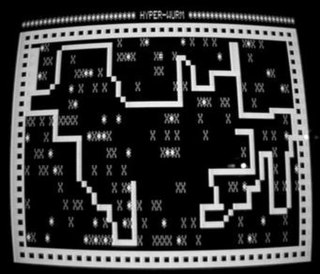
Snake is a genre of action video games where the player maneuvers the end of a growing line, often themed as a snake. The player must keep the snake from colliding with both other obstacles and itself, which gets harder as the snake lengthens. It originated in the 1976 two-player arcade video game Blockade from Gremlin Industries where the goal is to survive longer than the other player. The concept evolved into a single-player variant where a snake gets longer with each piece of food eaten—often apples or eggs. The simplicity and low technical requirements of snake games have resulted in hundreds of versions—some of which have the word snake or worm in the title—for many platforms.

Nibbles, also known by the source code's file name NIBBLES.BAS, is a variant of the snake video game concept used to demonstrate the QBasic programming language. Nibbles was written in QBasic by Rick Raddatz, who later went on to create small businesses such as Xiosoft and Bizpad.
A patch is a set of changes to a computer program or its supporting data designed to update or repair it. This includes bugfixes or bug fixes to remove security vulnerabilities and correct bugs (errors). Patches are often written to improve the functionality, usability, or performance of a program. The majority of patches are provided by software vendors for operating system and application updates.
MBASIC is the Microsoft BASIC implementation of BASIC for the CP/M operating system. MBASIC is a descendant of the original Altair BASIC interpreters that were among Microsoft's first products. MBASIC was one of the two versions of BASIC bundled with the Osborne 1 computer. The name "MBASIC" is derived from the disk file name MBASIC.COM of the BASIC interpreter.
Donkey, often known by its filename DONKEY.BAS, is a video game written in 1981, and included with early versions of the IBM PC DOS operating system distributed with the original IBM PC. It is a top-down driving game in which the player must avoid hitting donkeys. The game was written by Microsoft co-founder Bill Gates and early employee Neil Konzen.
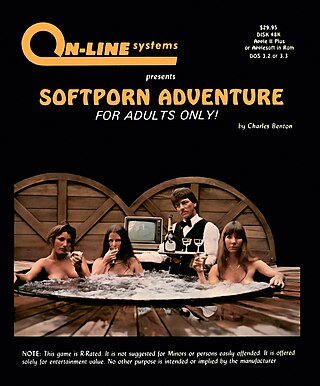
Softporn Adventure is a comedic, adult-oriented text adventure game produced for the Apple II in 1981. The game was created by Charles Benton and released by On-Line Systems, later renamed Sierra On-Line. Years later, Softporn Adventure was remade and expanded as Leisure Suit Larry series of adult-oriented video games, and the first entry in that series, 1987's Leisure Suit Larry in the Land of the Lounge Lizards, was a nearly direct graphical adaptation of Softporn Adventure. Another graphical version was released as Las Vegas for various Japanese computers in 1986 by Starcraft.
In computer programming, a runtime system or runtime environment is a sub-system that exists both in the computer where a program is created, as well as in the computers where the program is intended to be run. The name comes from the compile time and runtime division from compiled languages, which similarly distinguishes the computer processes involved in the creation of a program (compilation) and its execution in the target machine.
Star Trader is a 1974 video game and an early example of the space trading genre. The game involves players moving from star to star on a map of the galaxy, buying and selling quantities of six types of merchandise in a competition to make the most money. The game was developed by Dave Kaufman for computers in 1973, and its BASIC source code was printed in the January 1974 issue of the People's Computer Company Newsletter. It was reprinted in the 1977 book What to Do After You Hit Return. The game was the inspiration for the multiplayer Trade Wars series, beginning in 1984, and is thought to be the antecedent to much of the space trading genre.
A source-to-source translator, source-to-source compiler, transcompiler, or transpiler is a type of translator that takes the source code of a program written in a programming language as its input and produces an equivalent source code in the same or a different programming language. A source-to-source translator converts between programming languages that operate at approximately the same level of abstraction, while a traditional compiler translates from a higher level programming language to a lower level programming language. For example, a source-to-source translator may perform a translation of a program from Python to JavaScript, while a traditional compiler translates from a language like C to assembly or Java to bytecode. An automatic parallelizing compiler will frequently take in a high level language program as an input and then transform the code and annotate it with parallel code annotations or language constructs.
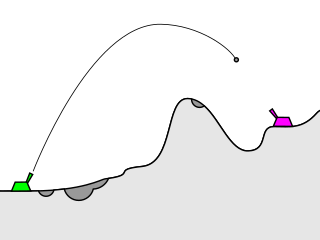
Artillery games are two or three-player video games involving tanks trying to destroy each other. The core mechanics of the gameplay is almost always to aim at the opponent(s) following a ballistic trajectory. Artillery games are among the earliest computer games developed; the theme of such games is an extension of the original uses of computer themselves, which were once used to calculate the trajectories of rockets and other related military-based calculations. Artillery games have been described as a type of "shooting game", though they are more often classified as a type of strategy video game.
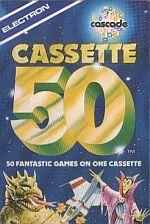
Cassette 50 is a compilation of games published by Cascade Games in 1983 for multiple 8-bit home computers. It was promoted based on the quantity of games included, all of which were programmed in BASIC and were of poor quality. According to the instructions, "the games will provide many hours of entertainment for all the family at a fraction of the cost of other computer games". The compilation was heavily advertised in home computer magazines. Buyers received a Timex digital calculator watch with each purchase.

TREK73 is a computer game based on the original Star Trek television series. It was created in 1973 by William K. Char, Perry Lee, and Dan Gee for the Hewlett-Packard 2000 minicomputer in HP Time-Shared BASIC. The game was played via teletype. Trek73 is so big that it needs the CHAIN feature of HP2000 BASIC.

Microsoft Entertainment Pack, also known as Windows Entertainment Pack or simply WEP, is a collection of 16-bit casual computer games for Windows. There were four Entertainment Packs released between 1990 and 1992. These games were somewhat unusual for the time, in that they would not run under MS-DOS. In 1994, a compilation of the previous four Entertainment Packs were released called The Best of Microsoft Entertainment Pack. A Game Boy Color version was released in 2001.

QBasic is an integrated development environment (IDE) and interpreter for a variety of dialects of BASIC which are based on QuickBASIC. Code entered into the IDE is compiled to an intermediate representation (IR), and this IR is immediately executed on demand within the IDE.
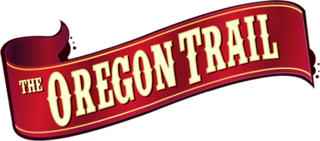
The Oregon Trail is a series of educational computer games. The first game was originally developed by Don Rawitsch, Bill Heinemann, and Paul Dillenberger in 1971 and produced by the Minnesota Educational Computing Consortium (MECC) in 1974. The original game was designed to teach 8th grade schoolchildren about the realities of 19th-century pioneer life on the Oregon Trail. The player assumes the role of a wagon leader guiding a party of settlers from Independence, Missouri, to Oregon's Willamette Valley via a covered wagon in 1848.












